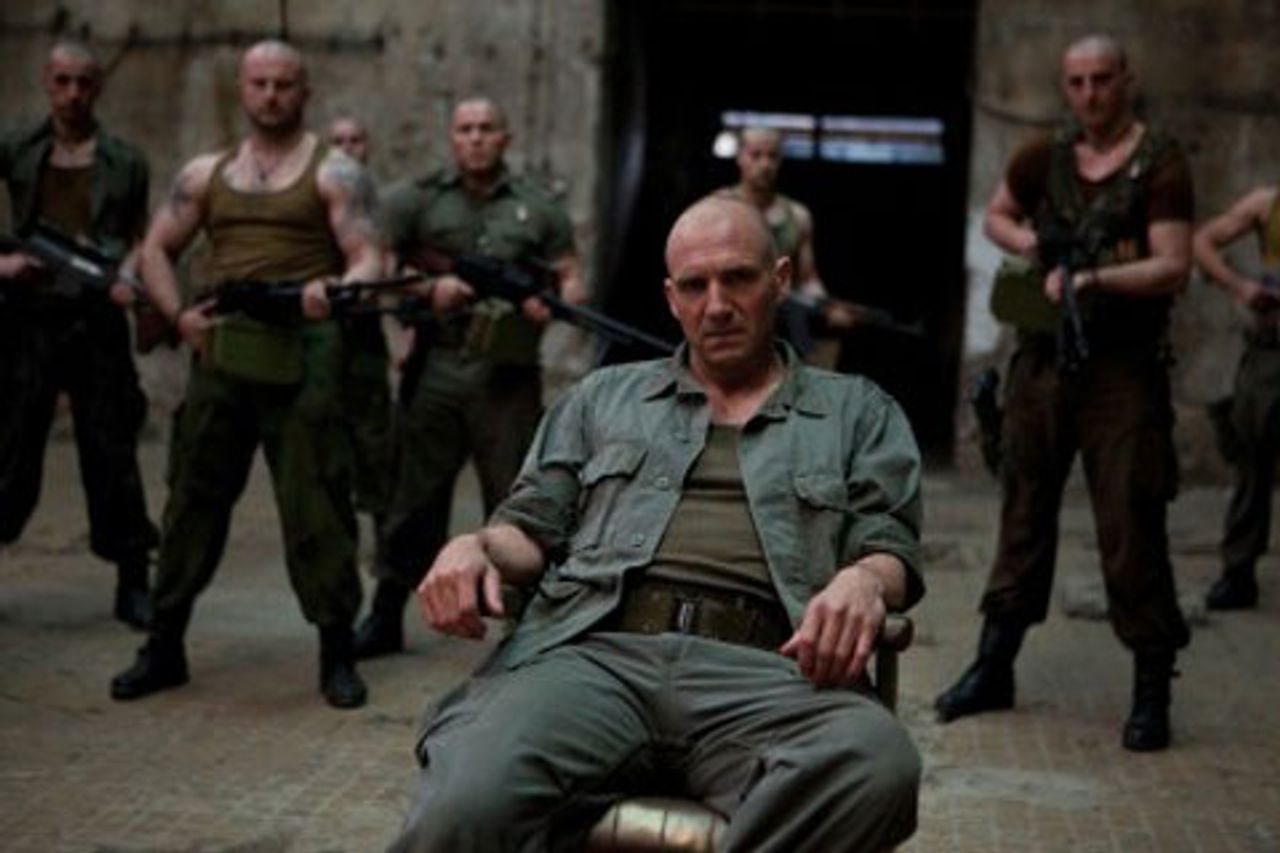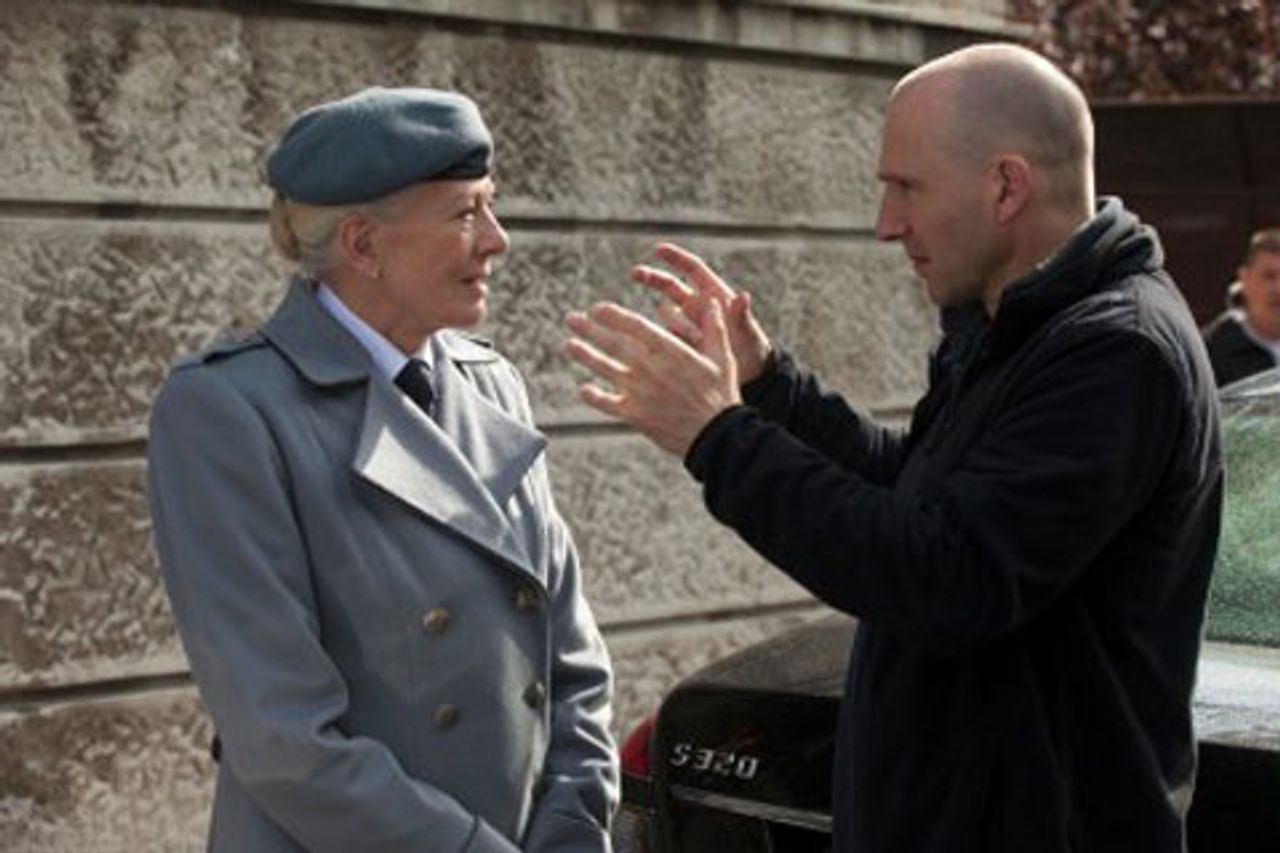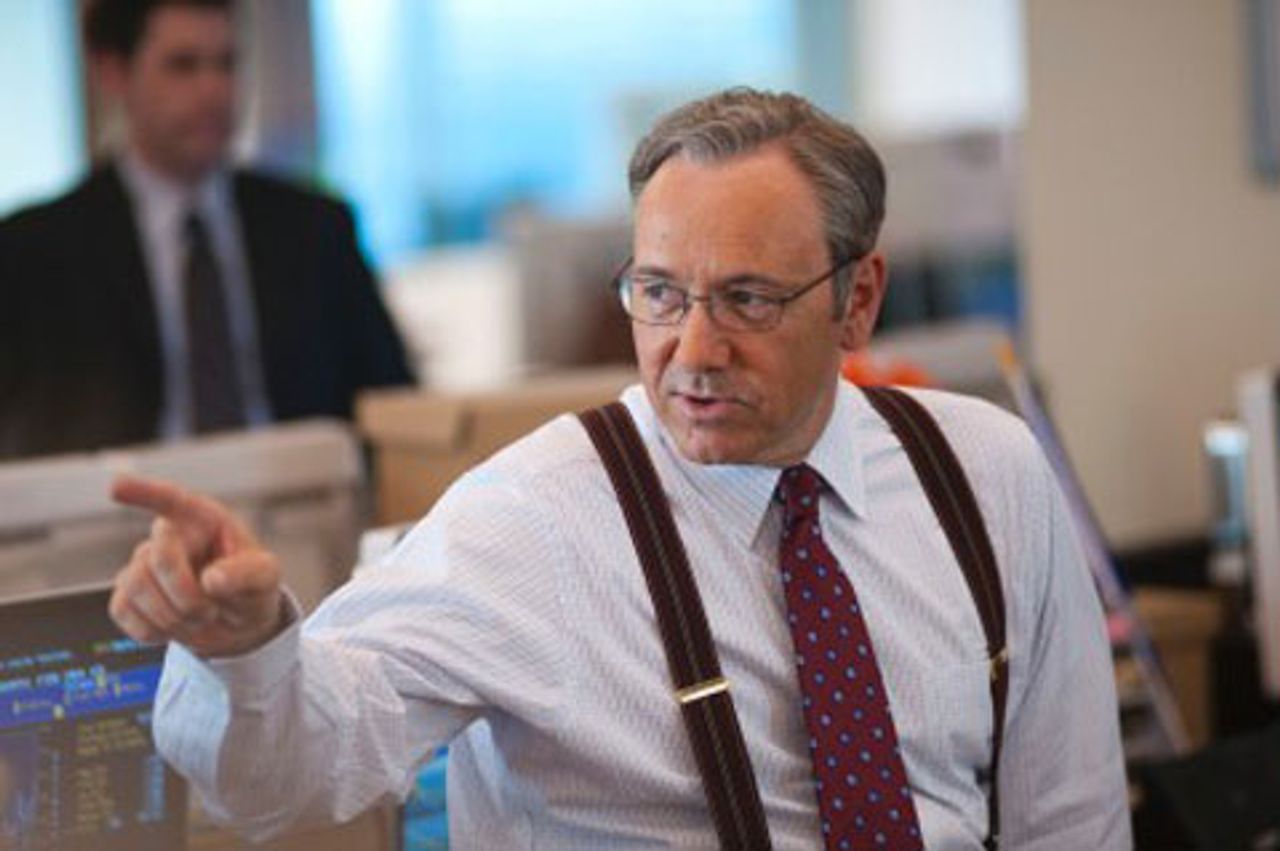This is the third in a series of articles on the recent Berlin film festival, the Berlinale, held February 10-20, 2011. Part 2 was posted on March 7 and Part 1 on March 3.
 Coriolanus
CoriolanusTwo of the most interesting films in the recent Berlin film festival’s competition section were a version of Shakespeare’s Coriolanus and J.C. Chandor’s Margin Call. The former is directed by the prominent British actor Ralph Fiennes, who also plays the principal role. Fiennes played the role of Coriolanus on the London stage in 2000. Since then, he has apparently cherished the idea of adapting for the screen one of Shakespeare’s lesser-known and more infrequently staged plays.
In his production notes, Fiennes makes clear it was the relevance of Coriolanus—set by Shakespeare in ancient Rome (according to history or legend, in the fifth century BC)—to current developments that motivated him to make the film. Accordingly, Fiennes has placed the action in the present day.
The film begins with food riots. We witness a large crowd led by a small group of men and women, drawn from different backgrounds, marching on Rome’s grain stores. The area is sealed off by armoured personnel carriers. The repressive military operation is led by General Caius Martius in full military garb, who personally confronts the demonstrators and makes clear he will brook no opposition.
 Coriolanus
CoriolanusMartius has been brought up in a military household and feels most at home on the battlefield. He will have nothing to do with democracy and its trappings. According to his mother, Volumnia (played by Vanessa Redgrave): “Blood is more beautiful than milk, the wound than the breast, warfare than peaceful feeding”.
Following his success in securing a bloody victory over a rival state, Martius is renamed Coriolanus as a mark of honour and is promoted by his mother and other patricians as the future ruler (consul) of Rome. The consul is an elected post. Coriolanus is now expected to plunge into the crowd, shake hands and win popular support for his nomination. This is a step too far for the haughty and autocratic general.
Unable to submit himself to democratic rituals, Coriolanus is turned on by his backers and denied the consul’s office. An outraged Coriolanus, his dignity struck to the quick, decides he would prefer to ally himself with Rome’s arch-enemy and wage war on his native city rather than submit to the will of the masses.
Coriolanus is one of Shakespeare’s most overtly political plays. There is little of the reflective monologues and self-questioning to be found in other tragedies such as Hamlet, Macbeth and King Lear. This lack of self-reflection finds its equivalent, according to Fiennes, in modern politics. In his notes, Fiennes lists George Bush and Tony Blair, for example, as two modern-day politicians who match “the arrogance and intransigence” of Coriolanus.
The larger political dimensions of the play were underlined by the nineteenth century British essayist William Hazlitt, who wrote of Coriolanus: “The whole dramatic moral of Coriolanus is that those who have little shall have less, and that those who have much shall take all that others have left”.
German playwright Bertolt Brecht wrote a well-known adaptation of the play in the early 1950s, which was first staged in Frankfurt in 1962. His interesting essay on the subject, “Study of the First Scene of Shakespeare’s Coriolanus,” composed in the form of a dialogue, is included in Brecht on Theatre (edited by John Willett, 1992). Brecht describes the opening scene: “A group of plebeians has armed itself with a view to killing the patrician Caius Martius, an enemy of the people, who is opposed to lowering the price of corn.”
Fiennes’s notes, pointing to the disdain for democratic processes on the part of Bush-Blair, are entirely appropriate, just as the comment by Hazlitt (also cited by Fiennes) makes clear that in the field of elemental class relations little has changed over the course of the last century. Such a critical view of modern political life is indeed a necessary starting point for transposing and projecting Coriolanus effectively into the present day. In this regard, Fiennes’s version has its strengths and weaknesses.
Fiennes has excised large portions of the text, trimming it down to just over two hours, but remained largely true to Shakespeare’s language and plot. In addition to his own solid performance, Fiennes draws upon the services of a number of fine actors (Brian Cox as Agrippa, James Nesbitt as Sicinius, Gerald Butler as Aufidius and Redgrave as Volumnia).
The most intense scenes in the play occur between Coriolanus and Volumnia. Volumnia is the powerful backbone of Coriolanus, expressing her delight when she sees him with new scars brought back from the battlefield. The proud mother harbours political designs for her son and uses all her wiles to pressure him to gain approval by showing his new scars to the populace (a standard practice).
The location selected for shooting the film (largely for financial reasons) was Serbia and its capital Belgrade. The locale had certain built-in advantages. The filmmakers were able to use the country’s parliament building for important scenes. Also, broad derelict areas of Belgrade—evidently the product of NATO’s 1999 bombing—provided an ideal setting for the film’s battle scenes.
Fiennes observes that in addition to the parliament building, the Serb government also made available its elite military commandos, who feature in the film’s overly long, choreographed battle sequences. The latter strike a jolting note and reveal a certain one-sidedness in Fiennes attempt to transport Coriolanus into the here and now, as well perhaps as the almost inevitable problems involved in “modernising” works of the Elizabethan or any other relatively remote era. Some elements will transfer well…others simply won’t. Directors who attempt to force the matter run into difficulties.
Shakespeare laid the drama in Rome and wrote his text almost exactly four centuries ago (c. 1605-1608). Since then, new elites and political forces have developed in modern society, whose power, influence and arrogance are in many respects a match for the military’s. Fiennes does his best to bring out the imperial general’s internal conflicts, but it is an uphill battle to generate empathy for a character Fiennes himself equates with Bush and Blair.
And, if there is one lesson to be learnt from the most recent uprisings in the Maghreb, it is that even the most powerful of armies, headed by the most intransigent of commanders, is not able to withstand the might of a broad movement of the working masses. But Fiennes’s Coriolanus is a fascinating glimpse at a significant work.
Margin Call
The finance aristocracy is hardly a new elite, but it has assumed unprecedented levels of power during the past 30 years. A new film that attempts to portray the physiognomy and psychology of this elite is the American film Margin Call.
 Margin Call
Margin CallIn notes for the film, both its writer-director, J.C. Chandor, and an actor-producer, Zachary Quinto, go to great lengths to deny their film should be interpreted as a critique of modern capitalism. Chandor writes that his intention was not to produce an “anti-corporate screed”, while Quinto declares: “There’s going to be a thousand versions of this [story] that are going to be ‘message films’...you’re going to see versions that want to put Wall Street on a pike and carry it around town and teach people the evils of capitalism. This movie doesn’t really do that. Its a very human story”.
Thankfully, the final product is better than these disclaimers would indicate. Chandor remarks that in working on the script for Margin Call, he relied heavily on the experiences of his father who worked for Merrill Lynch (the famed Wall Street securities firm) for nearly 40 years.
Margin Call treats a 24-hour period at a large US investment bank in the early stages of the financial crisis in 2008. It opens with mass sackings at the bank, following an investigation into the financial institution’s activities by the “human resources” department. Along with 80 percent of the bank’s staff, senior trader Eric Dale (Stanley Tucci) is ordered to pack his belongings as fast as possible to be escorted from the premises by a security guard. Upon leaving the building, Dale attempts to make a call only to find out that his cell phone has been capped by his zealous former employer.
In his last days working for the bank, Dale had uncovered a veritable mountain of phoney investments closely resembling the credit default swaps (CDS) that brought down Lehman Brothers. Threatened with losses of up to a trillion dollars, the bank’s management, headed by chairman John Tuld (Jeremy Irons), meet at short notice to develop a rescue strategy. The strategy is to sell off the virtually worthless bonds in the shortest possible time at the highest possible price. This will save the bank, but is likely to unleash a chain-reaction crash when the real worth of the bonds (i.e., zero) is revealed. This operation is led by bank veteran Sam Rogers (Kevin Spacey).
The bankers are not portrayed in the movie as monsters. A number of the characters realise that what they are doing is morally suspect, but they seek to differentiate themselves from outright criminals with a series of rationalisations—either blaming the greed of investors, or in the case of CEO Tuld, claiming there always have been and always will be financial crises.
Suitable financial packages ease the qualms of anyone in the company who still has concerns about what he or she is doing. The junior traders pick up half a million dollars a year, heads of departments, $2.5 million, with untold billions pouring into Tuld’s lap. In the course of the emergency meeting, the latter orders his subordinates to “speak to me in English …. It wasn’t brains that got me here”.
The team given the job of selling the worthless bonds are promised a hefty bonus for their half-day’s work, while the sacked Dale, who brought the crisis to light and certainly does have a conscience, is offered $500,000 to sit in a chair for six hours and keep his mouth shut while the selling takes place. Every problem can be resolved if the stash of cash is sufficient.
Despite the caveats of its director, Margin Call invariably leads the viewer to question not only the thoroughly dubious activities of a single bank, but also a system which could allow such atrocities to take place. In its portrayal of the modern finance world, whether wittingly or not, Chandor’s film underlines in extreme form the process already identified by Marx more than a century and a half ago, whereby the bourgeoisie tore “asunder the motley of ties that bound man to his ‘natural superiors’, and left no other nexus between man and man than naked self interest, callous ‘cash payment’ ”.
